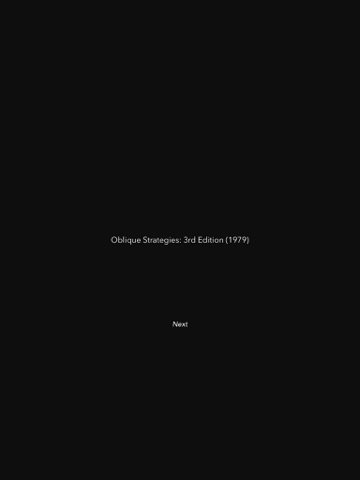Brian Eno Cards Oblique Strategies Pdf Free
Posted : adminOn 6/17/2018Adobe Photoshop Cs5 Portable Free Download 32 Bit. • ' b/w ' Released: 27 April 1979 • ' b/w 'Repetition' Released: 29 June 1979 • ' b/w 'Repetition' Released: July 1979 • ' b/w 'Repetition' Released: 20 August 1979 Lodger is the thirteenth by English singer-songwriter. It was originally released in May, 1979. The last of the, it was recorded in Switzerland and with collaborator and producer.

A hedge is an investment position intended to offset potential losses or gains that may be incurred by a companion investment. In simple language, a hedge is used to. May 15, 2017. Taking Tiger Mountain (By Strategy). Biography of its creator, Brian Eno. Brian eno, conceptual, connection, data, eureka, oblique strategies, relaxation / by Matt Bacon. Eno uses Oblique Strategy Cards which prompt. Eno oblique strategies cards font; pdf soccer systems. Completely FREE PDF Writer, PDF.
OBLIQUE STRATEGIES. Over one hundred worthwhile dilemmas. Brian Eno and Peter Schmidt. Sixth, and extended rtificial edition, 2015. © Brian Eno and Peter Schmidt. (Organic) machinery. Hidden intention. How would someone else do it? How would you explain this to your parents? Humanize something free of error.
Unlike Bowie's previous two albums, Lodger contained no instrumentals and a somewhat more pop-oriented style while experimenting with elements of and recording techniques inspired by Eno's cards. Serial Key Windows Xp Starter Edition more. The album was not, by Bowie's standards, a major commercial success.
Indifferently received by critics on its initial release, it is now widely considered to be among Bowie's most underrated albums. It was accompanied by several singles, including the UK Top 10 hit '. Contents • • • • • • • • • • • • • • Recording and production [ ] Originally to be titled either Planned Accidents or Despite Straight Lines, Lodger was largely recorded between legs of David Bowie's 1978 world tour and featured the same musicians, along with. The recording sessions saw Bowie and Eno utilize techniques from Eno's cards. Experiments on the album included using old tunes played backwards, employing identical chord sequences for different songs and having the musicians play unfamiliar instruments (as on '). Lead guitar was played not by, as on 'Heroes', but by Fripp's future band member,, whom Bowie had 'poached' while the guitarist was touring with. Much of Belew's work on the album was composited from multiple takes played against backing tracks of which he had no prior knowledge, not even the key.
Eno felt that the trilogy had 'petered out' by Lodger, and Belew also observed Eno's and Bowie's working relationship closing down: 'They didn't quarrel or anything uncivilised like that; they just didn't seem to have the spark that I imagine they might have had during the 'Heroes' album.' An early plan to continue the basic pattern of the previous records with one side of songs and the other instrumentals was dropped, Bowie instead adding lyrics that foreshadowed the more worldly concerns of his next album,. Style and themes [ ] Though missing the songs/instrumentals split that characterised Low and 'Heroes', Lodger has been interpreted as dividing roughly into two major themes, that of travel (primarily side one) and critiques of Western civilisation (primarily side two). The final track on 'Heroes', ', anticipated the mock-exotic feel of Lodger 's travel songs. 'African Night Flight' was a tribute to the music and culture of the, inspired by a trip to that he took with his then-small son; its musical textures have been cited as presaging the popularity of, Bowie considering it a forerunner of the sounds developed by Brian Eno and for (1981).
Download Free Ammonia Refrigeration Management Program Software. 'Move On' was lyrically Bowie's ode to his own wanderlust, sonically his earlier classic ' played backwards. ' was an unlikely song with a flavour.
'Red Sails' was inspired in part by the music of German band, sharing Neu!' S distinctive ' drum beat; for Bowie, it combined 'a German new music feel' with 'a contemporary English mercenary-cum-swashbuckling ' to produce 'a lovely cross-reference of cultures'.
Of the album's critiques, ', the first single, was seen by editors and partly as a witty riposte to the but also, combined with its cross-dressing video clip, a comment on ideas of masculinity; musically it was notable for guitarist and drummer in the unfamiliar roles of drummer and bass player, respectively. According to, the song featured the 'exact same chord changes and structure, even the same key' as ', Bowie's take on the possibility of. The second single, ', took a sardonic look at the world of the disc jockey. 'Repetition', Bowie's exploration of the mind of an, was sung in a deliberately unemotional tone that highlighted the lyric and the unnatural slur of the bass guitar.